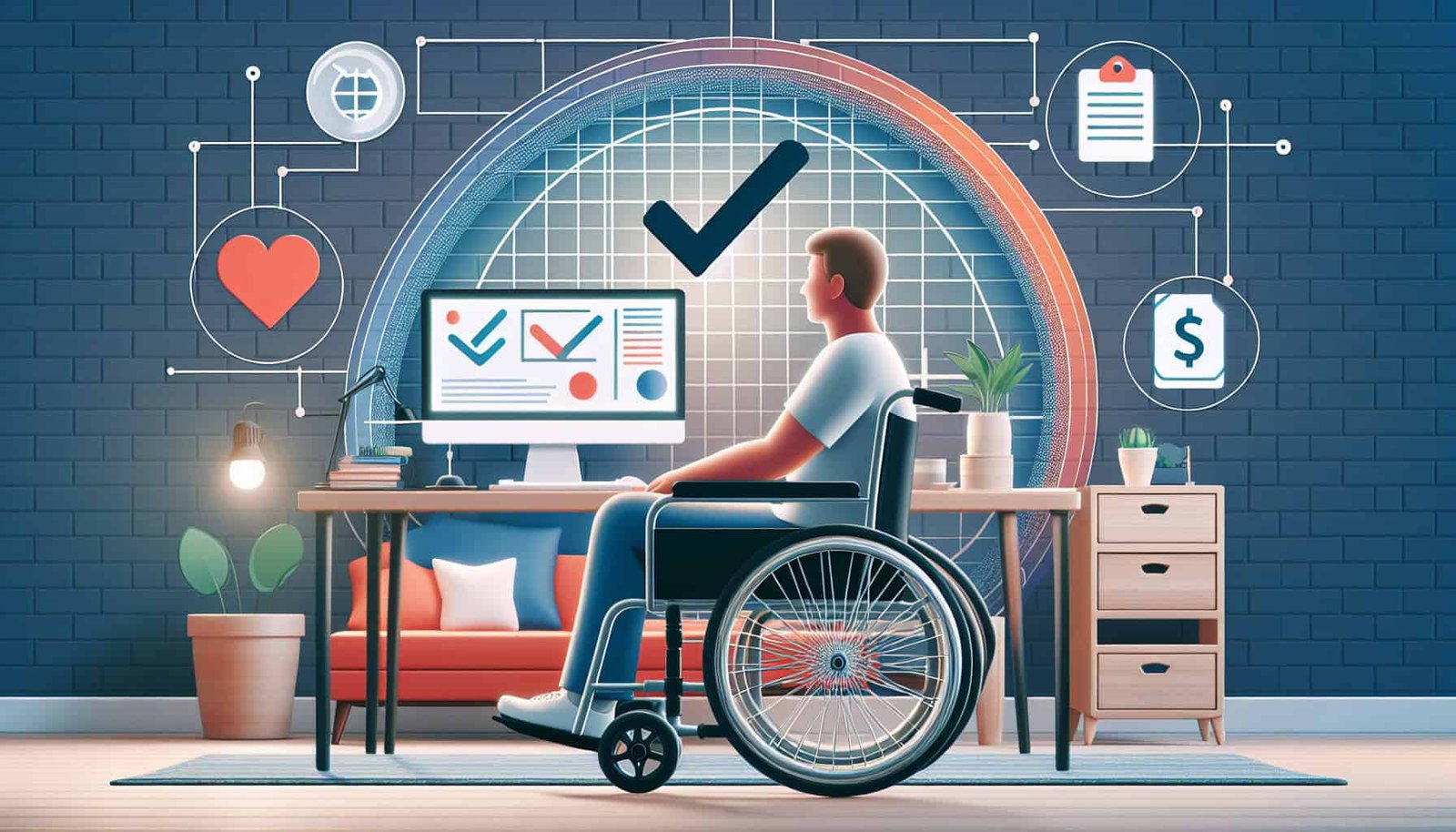Imagine a world where individuals with disabilities have the opportunity to work on their own terms, from the comfort of their own homes, and have the flexibility to define their own schedules. Freelancing has emerged as a game-changer in the job market, offering a range of benefits specifically tailored to meet the needs of individuals with disabilities. In this article, we will explore how freelancing empowers individuals with disabilities to utilize their unique skills, overcome traditional employment barriers, and create a thriving career path that celebrates their abilities.

Increased flexibility and control over work
Flexibility in choosing working hours
Freelancing offers individuals with disabilities the flexibility to choose their working hours. Unlike traditional 9-to-5 jobs, freelancers have the freedom to set their own schedules based on their personal preferences and needs. This allows them to work during times when they are most productive or when they feel the least restricted by their disability. This flexibility can greatly enhance their overall work experience and enable them to achieve a better work-life balance.
Ability to work from anywhere
One of the key advantages of freelancing is the ability to work from anywhere. Individuals with disabilities often face physical or accessibility barriers that can make it challenging for them to commute to a traditional workplace. However, as a freelancer, you can choose to work from the comfort of your own home or anywhere else that suits your needs. This not only eliminates the stress and physical limitations associated with commuting, but also allows you to create a comfortable and accessible work environment that caters to your specific requirements.
Independence in decision-making
Freelancing empowers individuals with disabilities by giving them greater independence in decision-making. As a freelancer, you are your own boss and have full control over the projects you take on, the clients you work with, and the services you provide. This level of autonomy allows you to align your work with your personal values and preferences, ensuring that you are able to focus on projects that are both fulfilling and meaningful to you. It also enables you to tailor your work to accommodate any specific accommodations or adaptations that may be necessary for your disability.
Accessible work environment
No physical barriers
One major advantage of freelancing for individuals with disabilities is the absence of physical barriers. Unlike traditional workplaces that may not be fully accessible, freelancers have the liberty to create their own work environment that is specifically tailored to their accessibility needs. Whether it’s adjusting the height of your desk, installing assistive technology, or making other modifications, you have the freedom to design a workspace that facilitates your comfort and productivity.
Adaptable tools and technology
Freelancing allows individuals with disabilities to leverage adaptable tools and technology that cater to their specific needs. From screen readers for individuals with visual impairments to speech recognition software for those with mobility limitations, freelancers can utilize a wide range of assistive technologies that enable them to work efficiently and effectively. Being able to choose and adapt the tools that work best for you can significantly enhance your overall work experience and productivity.
Customizable workspaces
In addition to adaptable tools and technology, freelancing also offers the advantage of customizable workspaces. You have the freedom to create an environment that suits your individual preferences and needs. Whether that means working in a quiet and dimly lit space to accommodate sensory sensitivities or having easy access to mobility aids, freelancing allows you to design your workspace in a way that optimizes your comfort and productivity. This level of customization can greatly contribute to your overall work satisfaction and well-being.
Opportunity for financial independence
Ability to earn a living
Freelancing provides individuals with disabilities the opportunity to earn a living and achieve financial independence. It allows you to monetize your skills and expertise by offering your services directly to clients or through freelance platforms. This gives you the ability to generate a consistent income based on your capabilities and availability, without the need to rely on traditional employment structures that may have inherent barriers or limitations. Whether it’s graphic design, writing, coding, or any other skill, freelancing enables you to leverage your talents and turn them into a viable source of income.
Potential for higher income
Freelancing also presents the potential for higher income compared to traditional employment for individuals with disabilities. As a freelancer, you have the opportunity to negotiate your rates and fees, potentially earning more for your time and effort. Additionally, freelancers can take on multiple projects simultaneously, allowing them to diversify their income streams and increase their earning potential. This increased control and potential for higher income can have a significant positive impact on your financial stability and overall quality of life.
Reduced reliance on government assistance
By engaging in freelancing, individuals with disabilities can reduce their reliance on government assistance. While government support can be essential in providing necessary resources and assistance, freelancing offers the opportunity to become financially self-sufficient. By earning a living through freelancing, you can reduce or eliminate the need for certain forms of government assistance, providing a sense of pride and autonomy. This can contribute to improved self-esteem and empowerment, knowing that you are able to take care of yourself and contribute to society through your own efforts.
Expanded job opportunities
Access to global job market
Freelancing opens up a world of job opportunities for individuals with disabilities. Instead of being limited to local job markets, freelancers can tap into the global marketplace. The internet has made it possible to work with clients from all over the world, breaking down geographical barriers and allowing freelancers to explore a wide range of industries and projects. This expanded job market provides individuals with disabilities the chance to showcase their skills and expertise to a global audience, increasing their chances of finding fulfilling and rewarding work.
Diverse range of clients and projects
Freelancing offers individuals with disabilities the opportunity to work with a diverse range of clients and projects. Unlike traditional employment where you may be limited to a specific industry or company, freelancing allows you to explore different sectors and collaborate with clients from various backgrounds. This not only broadens your professional experience but also enables you to build a diverse portfolio, showcasing your versatility and adaptability. The ability to work on a wide range of projects can also contribute to personal growth and skill development.
Multiple income streams
Another benefit of freelancing for individuals with disabilities is the ability to have multiple income streams. By taking on different projects and clients simultaneously, freelancers can diversify their sources of income. This not only provides a financial safety net but also reduces the risk of relying solely on one client or project. Having multiple income streams can offer increased stability and security, allowing you to better manage your financial resources and plan for the future. It also gives you the freedom to explore different areas of interest and expand your professional network.

Improved work-life balance
Flexible scheduling for personal needs
Freelancing offers individuals with disabilities the flexibility to schedule work around their personal needs. Whether it’s doctor appointments, therapy sessions, or simply taking breaks to recharge, freelancers can easily accommodate these personal commitments without having to seek permission or approval from a supervisor. This level of flexibility enables individuals with disabilities to prioritize their health and well-being, ensuring they have the necessary time and energy to take care of themselves while still meeting their professional responsibilities.
Reduced commuting time and expenses
One of the significant advantages of freelancing is the elimination of commuting time and expenses. For individuals with disabilities, commuting to a traditional workplace can often be physically exhausting and time-consuming. Freelancing allows you to work from the comfort of your own home or any other location, eliminating the need to commute altogether. This not only saves valuable time but also reduces transportation expenses, making freelancing a cost-effective alternative for individuals with disabilities.
Ability to prioritize health and well-being
Freelancing provides individuals with disabilities the ability to prioritize their health and well-being. By having control over their own schedules and workloads, freelancers can allocate time for self-care activities such as exercise, rest, and hobbies. This freedom allows individuals with disabilities to manage their energy levels and prevent or manage any health conditions effectively. Prioritizing health and well-being not only enhances productivity and job satisfaction but also contributes to a higher quality of life overall.
Enhanced career growth and development
Opportunity to build a diverse portfolio
Freelancing presents individuals with disabilities with the opportunity to build a diverse portfolio of work. Unlike traditional employment where you may be limited to one company or industry, freelancing allows you to work on a variety of projects across different sectors. This range of experiences not only enhances your skill set but also showcases your versatility and adaptability to potential clients and employers. Building a diverse portfolio can open doors to new and exciting career opportunities, enabling individuals with disabilities to explore different industries and expand their professional network.
Skill acquisition through a variety of projects
Alongside building a diverse portfolio, freelancing offers individuals with disabilities the opportunity to acquire new skills through various projects. As a freelancer, you have the freedom to work on assignments that align with your interests, allowing you to continuously learn and develop your skill set. This exposure to different projects nurtures your professional growth and adds depth to your expertise, making you a more valuable asset in the job market. Acquiring new skills not only enhances your career prospects but also boosts your self-confidence and self-esteem.
Ability to explore different industries
Freelancing empowers individuals with disabilities to explore different industries and sectors. Instead of being confined to a single job or industry, freelancers have the flexibility to work with clients from various fields. This exposure to different industries allows you to expand your knowledge and understanding of different sectors, potentially uncovering new passions or areas of expertise. This exploration can lead to diverse career opportunities and the discovery of fulfilling work that aligns with your skills, interests, and aspirations.

Reduced workplace discrimination
Ability to work without facing stigma
Freelancing provides individuals with disabilities the opportunity to work without facing the stigma and discrimination that can be prevalent in traditional workplaces. As a freelancer, your clients judge you based on your skills, abilities, and the quality of your work, rather than focusing on your disability. This level playing field allows you to showcase your talents and expertise without the biases or preconceived notions often associated with disabilities. Freelancing offers a judgment-free platform where you can be appreciated and valued for your skills and contributions.
Equal treatment based on skills and abilities
In the realm of freelancing, equal treatment is based on skills and abilities rather than physical appearance or perceived limitations. Clients value freelancers for their capabilities and the quality of their work, regardless of disability. This equal treatment not only fosters a more inclusive work environment but also promotes a sense of fairness and meritocracy. Freelancers with disabilities have the opportunity to compete on an equal footing with their peers, providing a level playing field for professional growth and success.
Freedom to disclose disability status at own discretion
Freelancers have the freedom to disclose their disability status at their own discretion. Unlike in traditional employment where individuals may feel pressured to disclose their disability during the hiring process or keep it hidden for fear of discrimination, freelancers have the autonomy to decide when and how to share this information. This freedom allows individuals with disabilities to control their own narrative and focus on showcasing their skills and expertise without the potential bias that disclosing disability status may introduce. The ability to maintain this level of privacy and control over personal information is a significant advantage of freelancing for individuals with disabilities.
Flexible work arrangements
Part-time or full-time options
Freelancing offers individuals with disabilities the flexibility to choose between part-time or full-time work arrangements. Depending on your personal circumstances and needs, you can decide how many hours you want to dedicate to your freelance work. This level of flexibility is particularly beneficial for individuals with disabilities who may have fluctuating energy levels or varying levels of support or care requirements. Being able to adapt your work arrangements to suit your individual needs allows you to find the optimal balance between work and personal life.
Ability to adapt to changing health conditions
Another advantage of freelancing is the ability to adapt to changing health conditions. Individuals with disabilities may experience fluctuations in their health due to various factors. Freelancing provides the flexibility to adjust your workload and work hours to accommodate these changes. Whether you need to take a temporary break or reduce your workload during times of increased health challenges, freelancing allows you to adapt your work arrangements to support your well-being while still maintaining a source of income and professional engagement.
Opportunity to find suitable work-life integration
Finding suitable work-life integration is often a challenge for individuals with disabilities. Freelancing offers the opportunity to design a work-life integration that suits your unique needs and circumstances. Whether you prefer to work in shorter, focused bursts with breaks in between or require flexible working hours to accommodate medical appointments or personal commitments, freelancing allows you to create a schedule and work rhythm that promotes productivity while respecting your health and personal life. This ability to tailor your work arrangements enables individuals with disabilities to strike a balance between professional obligations and personal well-being.

Increased confidence and self-esteem
Recognition for skills and contributions
Freelancing provides individuals with disabilities the opportunity to gain recognition for their skills and contributions. The feedback and positive reinforcement received from clients serve as a validation of your abilities and expertise. This recognition can significantly boost your confidence and self-esteem, reaffirming your value in the professional world. By being acknowledged for the quality of your work, you are empowered to further develop your skills and embrace new challenges, ultimately leading to personal and professional growth.
Growth in self-belief and self-worth
Freelancing offers individuals with disabilities the chance to experience personal growth in terms of self-belief and self-worth. By overcoming the challenges and barriers that may come with their disability, freelancers develop resilience and a strong sense of self. The ability to thrive in a competitive and demanding work environment boosts their self-confidence and belief in their capabilities. Freelancing provides individuals with disabilities with real-world evidence of their skills and worth, enabling them to overcome self-limiting beliefs and embrace their true potential.
Overcoming challenges and achieving success
Freelancing empowers individuals with disabilities to overcome challenges and achieve success on their own terms. By navigating a professional landscape that values their skills and contributions, freelancers can defy societal expectations and misconceptions about disability. This success not only helps challenge stereotypes and break down barriers but also inspires others with disabilities to pursue their own dreams and aspirations. Embracing the challenges and triumphs of freelancing fosters a sense of accomplishment and satisfaction that can have a profound impact on an individual’s confidence and well-being.
Community support and networking
Connections with like-minded freelancers
Freelancing provides individuals with disabilities the opportunity to connect with like-minded individuals in the freelance community. By joining online platforms, attending virtual events, or participating in forums and groups, freelancers can build relationships with others who share similar experiences and challenges. These connections allow for the exchange of knowledge, support, and resources, creating a sense of belonging and camaraderie. Having a community of peers who understand the unique aspects of freelancing with a disability can offer valuable advice, encouragement, and inspiration.
Access to online communities and forums
In addition to building connections with like-minded freelancers, individuals with disabilities can access online communities and forums dedicated to supporting freelancers. These communities provide a wealth of information, resources, and opportunities for collaboration. They offer a space where freelancers can seek advice, share experiences, and learn from one another. Being part of an online community not only expands your professional network but also exposes you to a wide range of perspectives and insights that can contribute to your personal and professional growth.
Sharing experiences and resources
Freelancing allows individuals with disabilities to share their experiences and resources with others in similar situations. By sharing insights, tips, and strategies, individuals can help one another navigate the challenges and opportunities of freelancing with a disability. This mutual support fosters a collaborative and supportive environment where freelancers can learn from each other’s experiences and leverage shared resources to overcome obstacles and achieve success. By pooling their knowledge and resources, individuals with disabilities can collectively thrive in the freelance world and empower others to do the same.
In conclusion, freelancing offers a multitude of benefits for individuals with disabilities. The increased flexibility and control over work, accessible work environment, opportunity for financial independence, expanded job opportunities, improved work-life balance, enhanced career growth and development, reduced workplace discrimination, flexible work arrangements, increased confidence and self-esteem, and community support and networking all contribute to creating an inclusive and empowering professional journey. Freelancing empowers individuals with disabilities to overcome challenges, achieve success, and realize their full potential in the professional sphere. Through freelancing, individuals with disabilities can find fulfillment, financial stability, and a sense of autonomy while embracing their unique strengths and contributions.


